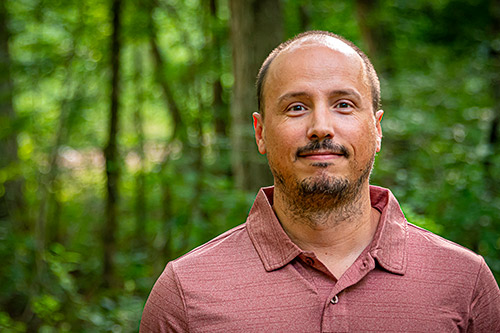MSU creates precision tool to improve forest management
Contact: Reagan Poston

STARKVILLE, Miss.—An assistant research professor in Mississippi State’s Department of Forestry is leading a collaborative team in creating a precision tool to help increase profits for timber producers and wood-mill consumers.
Bruno da Silva, also a scientist in the university’s Forest and Wildlife Research Center, is studying timber supply modeling as part of a $100,000 grant awarded by International Paper, one of the world’s leading producers of fiber-based packaging, pulp and paper.
The team is working on a model to aid timber producers in better understanding the impact of market variables and streamlining decision making for forest sector stakeholders.
“Our forestry market has become increasingly fragmented over the years,” da Silva said. “What we’re seeing is less room for error and the need for a more precise approach. Our goal is to make a model that can show how different variables like distance to the nearest mill, harvest costs and management practices will affect the timber supply, so forest market players can make informed decisions.”
The team aims to design a model that is user-friendly and freely available. Once the finishing touches are made to the model’s programming, the app will be available for download in QGIS, or open source GIS software, as well as in python. See https://www.qgis.org/en/site/ or https://www.python.org/ for more information.
“The model functions through mass amounts of regional data, both past and present, to predict future trends in the timber supply. Its output is dynamic and inherently linked to the needs of its user,” da Silva explained.
Shaun Tanger, assistant professor at MSU’s Coastal Research and Extension Center in Biloxi, is also on the project and looks forward to seeing how the model will help him as a forestry specialist.
“Part of my job with the MSU Extension Service is to make sure small forest landowners are able to keep a position in the market that remains sustainable and profitable. This model will show landowners how variables impact profitability based on their specific circumstances. This is precision timber production,” Tanger said.
The team is collaborating with several faculty from North Carolina State University including Frederick W. Cubbage, Robert C. Abt and Rajan Parajuli. Jesse Henderson with the U.S. Forest Service also is a collaborator.
For more information on MSU’s College of Forest Resources, visit www.cfr.msstate.edu.
MSU is Mississippi’s leading university, available online at www.msstate.edu.